UP TO THE MINUTE
Understanding the differences between snow cleats and snow fences

By the Metal Roof Experts at S-5!
Rooftop avalanches can be highly dangerous but choosing the right snow retention system for your roof can keep people and property safe throughout the winter.
Avalanches aren’t just terrifying events that can occur on the slopes; they can also happen at shopping centers, sports arenas, commercial buildings and in neighborhood backyards when snow unexpectedly slides off a building’s metal roof en masse. These avalanches might be on a smaller scale, but they still have a profound impact in terms of property damage, personal injury and in the worst-case scenario, death. The good news is that companies like S-5! have recognized this life-safety issue and addressed it by engineering certified snow retention systems.
These systems retain snow on top of the roof so it can melt and evaporate slowly, rather than plummeting in a dangerous avalanche. There are two general approaches to restraining snow on exposed fastened (EF) roofs. One is using “discontinuous” snow stops or cleats, which is a system of individual, smaller components spread across the roof. The second is a “continuous” snow fence or bar, which is a single or multiple assemblies that run along the edge of the roof. They both work to retain snow through increasing frictional resistance with obstacles to sliding snow, but they have different benefits and challenges.
It is important to choose the right system for your roof and situation; some systems can damage your roof even if there isn’t any snow! To better understand the snow retention options available for EF roofs, check out this overview from the experts at S-5!
Are snow bars really necessary on an exposed-fastened metal (EF) roof?
EF roofing is an economical metal roof option, which often leads people to ask, “Why should I spend money on snow bars?” The reason is simple: snow bars are vital to protect your family and property (roof, gutters and whatever is below) and reduce liability issues. The forces of snow are incredibly powerful. Even if a rooftop snow slide doesn’t cause injury or harm to someone or something below, damage from sliding snow could require total roof replacement or require you to live with leaks and maintenance issues for the rest of its service life. You need a system capable of resisting the enormous forces of sliding snow – and one that will do it reliably year after year.
Cleats vs. Continuous snow bars
Cleats (also called snow breaks, snow jacks, snow stops, etc.) are standalone parts affixed at intervals across the roof. They are offered from many vendors in plastic or metal.
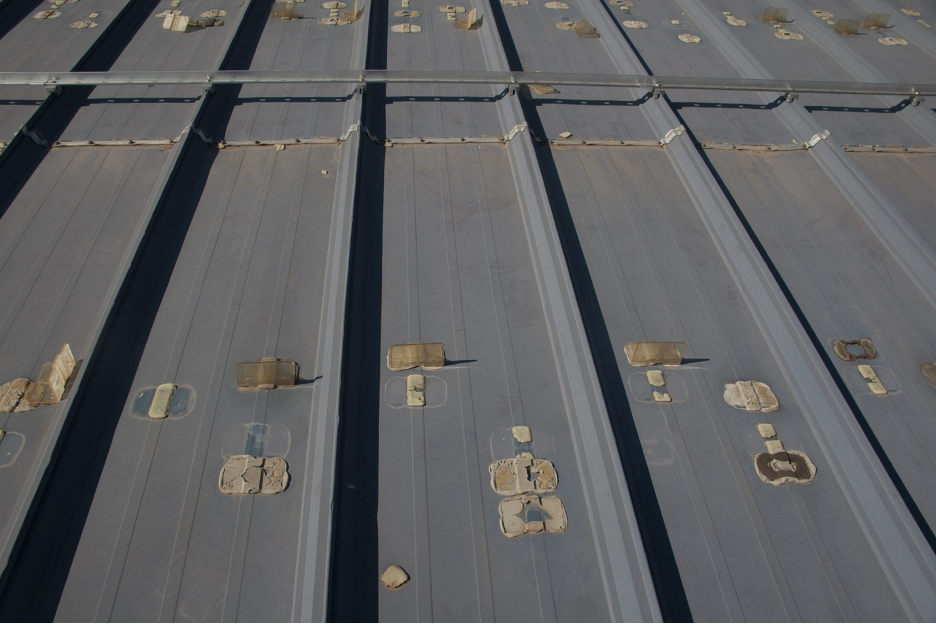
Plastic
- Plastic cleats offer a much shorter service life than their metal counterparts.
- The petroleum content of the plastic dries out over time, embrittling the part with is then prone to breaking.
- Their holding strength can be tested but seldom is, and the effectiveness of their strength deteriorates with age and embrittlement.
- When correctly engineered to the project, they often require vast quantities to complete the job, increasing the cost of what initially seemed like a less expensive option.
- When attached with screws, the fasteners and waterproofing needed to protect your EF roof are often of questionable quality.
- When glue is used to adhere the cleats to the roof, it degrades and loses its holding strength with exposure to the elements and eventually fails, precipitating a rooftop snow slide and leaving unsightly glue residues and holes on your roof.
- Clear plastic cleats are sometimes considered an aesthetic choice, but they glow in reflected sunlight, which makes them quite conspicuous and not “invisible” as advertised.
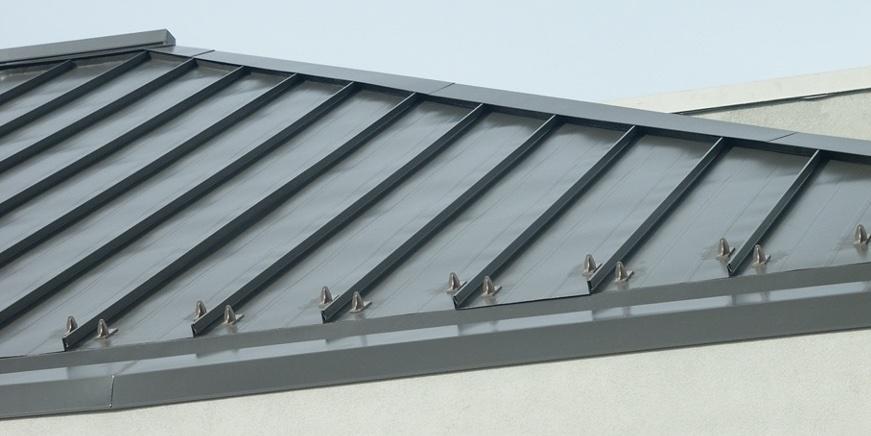
Metal
- Although some metal cleats are tested for holding strength, most are not.
- They often require vast quantities to complete the job, increasing their overall cost.
- When glue is used to adhere the parts to the roof, it degrades with exposure to elements and eventually fails, leaving unsightly glue marks on your roof hence lab-tested holding strength is quickly diminished and cannot be relied upon.
- When screwed into the roof, the fasteners and waterproofing are often of poor quality, leaving your roof unprotected from moisture and the elements after a short period.
Continuous snow bar systems
Continuous snow bars should generally run the length of the eave line, and they come in two types: improvised systems created from strips of sheet metal angle and snow bars purposefully designed to hold back accumulated snow. Here’s a breakdown of these two options.
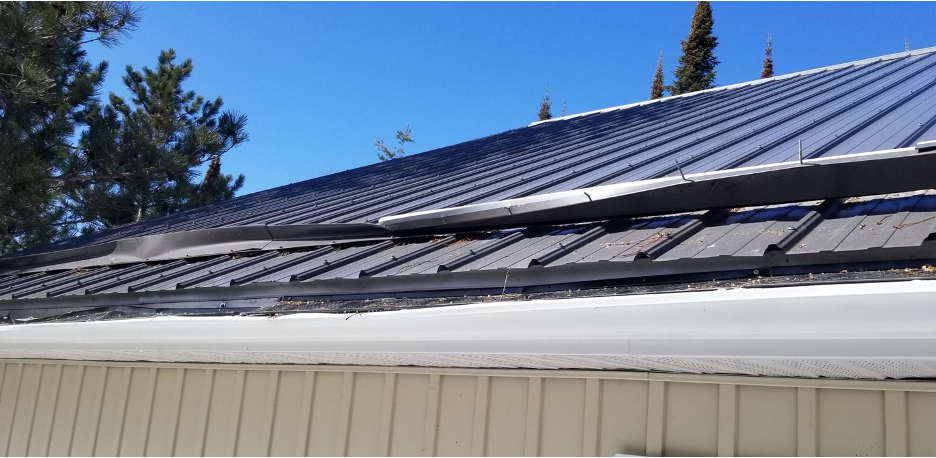
Thin pieces of sheet metal and bent trim
- Mounting pieces of sheet metal or bent trim is a superficial fix and not designed to restrain the real forces of snow. Because these fixes were never engineered nor tested for snow loads, they may look pretty, but they create a false sense of security and leave you open to potential roof and property damage, and even injury to a passerby.
- They cannot be properly affixed into the substrate or structure to withstand accumulated sliding snow but attached only to thin sheet metal.
- They are often waterproofed improperly (or not at all).
- When the metal strip or trim fails, it leaves holes and can cause other serious damage to your EF metal roof.
- This strategy is often viewed as a less expensive method for a continuous snow bar system, but what will the repairs ultimately cost you?
Clearly, these improvised systems are not a wise choice. First and foremost, choose a system designed and tested for safety to restrain the immense forces of snow on your EF roof.
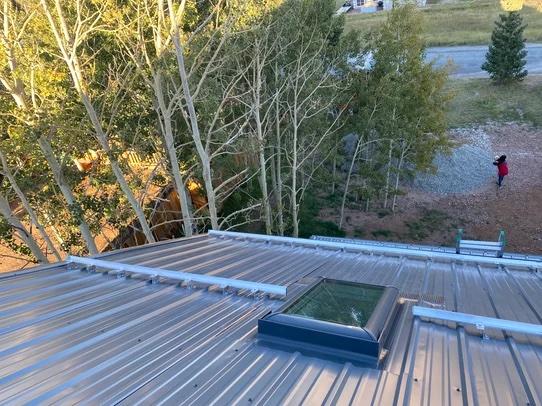
Verified snow bar systems
These systems are “verified” because they are attached to building structure and designed specifically to restrain snowpack, allowing it to exit the roof in a controlled way – through thaw, evaporation and melt water.
How do you know if your snow bars will hold back the snow?
The only way to ensure your system will hold up to the challenge is to ensure it has been appropriately load tested and engineered to your EF roof structure... The specific forces the system will experience should be calculated for the roof using:
- Your roof’s design snow load.
- Your roof’s structure (steel purlin, wood purlin or wood deck).
- Your roof’s slope (angle).
- Your roof’s eave-to-ridge length.
Important tip: Be sure you secure into the valley of the corrugation or the flat of the trapezoidal-rib panel and into the wood deck or structure below for the greatest holding strength.
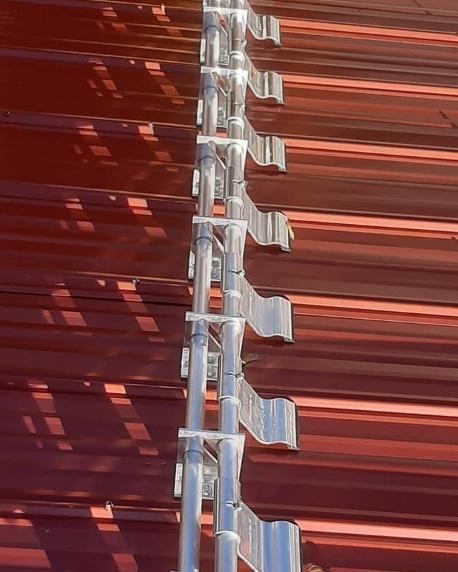
Here are critical considerations for selecting a verified continuous snow bar system:
- Look for products proven by independent testing laboratories with published easy-to-find proof of test results.
- Source only from vendors who use top-grade fastening and waterproofing. When fastening into the valley of the corrugation of flat of the panel, use products with:
- Factory applied butyl polymetric sealant in the bracket’s base, offering 60(+) years of weathertightness.
- Fasteners with protected EPDM gaskets (washers) to prevent moisture intrusion and corrosion.
Pleasing aesthetics and cost-effectiveness do not need to be sacrificed for reliable holding strength. A properly designed snow bar system can offer incredible strength for minimal cost, preserving the beauty of your roof.
Accumulated snow on your EF metal roof can release suddenly and cause injury or severe damage to anything below. An engineered and tested snow bar system – calculated to your specific roof profile – is the only sure way to restrain the forces of snow.
The market offers two main approaches to keep accumulated snowpack from falling off your roof: cleats (or unitized, discontinuous parts) and continuous snow bar systems.
Discontinuous cleats come in plastic or metal and generally have a high failure rate for holding back snow. Remember:
- They are rarely tested for strength, and plastic parts break over time.
- Their cost is misleading, as they often require many rows of parts to restrain the snowpack.
- Screw-down cleats tend to use screws and fasteners with poor-quality waterproofing.
- The glue used with glued-down cleats deteriorates and can mar the surface of your roof – or worse.
Continuous fence or bar systems can be much more effective, but only when they are properly engineered for snow retention:
- Never use pieces of continuous sheet metal or trim as snow bars. They are not designed, tested, nor engineered to restrain snow and can damage your metal roof.
- Attach snow bar systems designed for your specific roof and independently tested by credible third-party laboratories to prove their holding strength.
- Look for systems paired with high-quality, factory applied waterproofing and weathertight fasteners to last the life of your roof.
- If attractiveness and cost are concerns, find a tested snow bar system to blend beautifully with your EF roof featuring perfect color and finish-matching designed to last the life of the roof.
Original article source: S-5!
Learn more about S-5! in their Coffee Shop Directory or visit www.S-5.com.
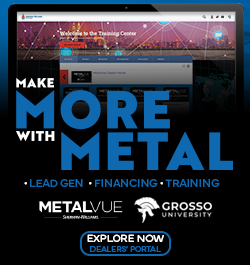
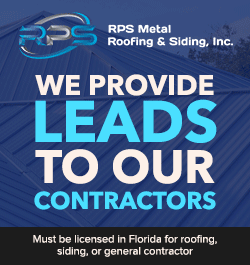


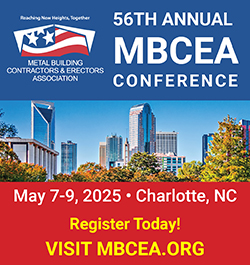









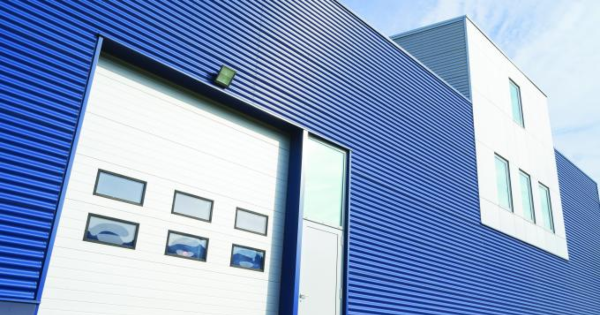


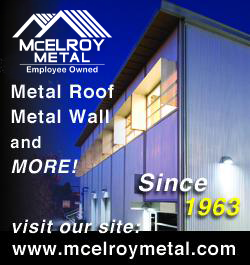

Comments
Leave a Reply
Have an account? Login to leave a comment!
Sign In